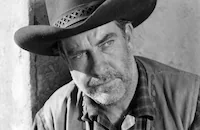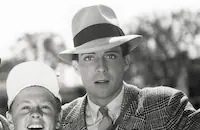The White Squaw
Cast & Crew
Ray Nazarro
David Brian
May Wynn
William Bishop
Nancy Hale
William Leslie
Film Details
Technical Specs

Synopsis
While hiding behind some rocks one night, Yotah, Eetay-O-Wahnee and several other Sioux Indians watch as Wyoming settler Sigrod Swanson and his sons Thor, Eric and Knute, poison their reservation's water supply. Rancher Thad Arnold appears and reminds Sigrod that because he never filed a claim on the land, it was the U.S. government's right to settle the Indians there. Furious, Sigrod argues that he was too busy building his home and rearing a family to file papers with the government. Yotah suddenly fires on the ranchers, shouting, "I hate all white men," even though Eetay-O-Wahnee protests that it is Purvis, the Indian agent, who should bring Swanson to justice. In the darkness, Yotah accidentally wounds Arnold, and in the confused shooting that follows, Sigrod sees that Eetay-O-Wahnee, whom he calls "the white squaw," is among the attackers. After the Indians return to their village, old Yellow Elk reveals that Eetay-O-Wahnee's white father, whose name he once promised never to reveal, has, through Purvis, been sending her money over the years. Much to Eetay-O-Wahnee's surprise, Yellow Elk then hands her two thousand dollars. Determined to use her wealth to buy cattle for her starving people, she and Yotah ask cattleman Bob Garth if they may purchase his animals, but he claims that the herd is worth twice that much. Yellow Elk finally reveals that Arnold is Eetay-O-Wahnee's father, and she rides to his ranch seeking help. Meanwhile, Arnold, realizing he is about to die of his bullet wound, tells his daughter Kerry about her half sister Eetay-O-Wahnee, born to him and his Sioux wife, Yellow Elk's sister, when he was a soldier in the Black Hills many years before. Afraid he would be called a "squaw man" for loving an Indian woman, Arnold placed his half-Sioux daughter in Yellow Elk's care when the child's mother died. Kerry is shocked by this news, but Arnold urges her to give Eetay-O-Wahnee half of his property upon his death. He then expires, whereupon Sigrod persuades Kerry to burn Arnold's will and keep the old man's story a secret. Just then, Eetay-O-Wahnee arrives. Accusing her of having killed Arnold during the shootout, Sigrod and Kerry turn her away. Eetay-O-Wahnee rides to town to tell Purvis that Sigrod has been poisoning the water, but Sigrod arrives and demands her arrest. Because there is no evidence implicating Eetay-O-Wahnee in Arnold's killing, Purvis and the sheriff let her go, after which Sigrod searches for Garth to forbid him from selling cattle to the Indians. Sigrod's hatred of Indians so angers Bob that he defiantly accepts Eetay-O-Wahnee's money. Driven nearly mad with fury, Sigrod attacks Bob and almost kills him. Purvis and the sheriff break up the fight, but later, as Eetay-O-Wahnee and Bob are riding to her village, they discover that Sigrod's sons have killed Bob's friend Joe and scattered the herd. As Bob convalesces in Eetay-O-Wahnee's teepee, she rides back to town and is followed by Yotah. When Sigrod's son Eric attacks Eetay-O-Wahnee, Yotah kills him and flees. Sigrod then has Eetay-O-Wahnee arrested for Eric's murder. Yotah tells Bob and Yellow Elk that Eetay-O-Wahnee must have killed Eric, whereupon the old Indian gives Bob a duplicate of Arnold's will. Realizing that the will offers Eetay-O-Wahnee her only hope for a fair trial, Bob delivers it to Purvis. Unaware that Purvis has placed the document in his pocket, Kerry tells Sigrod and his sons to destroy the will by blowing up the safe in the Indian agent's office. The dynamite blasts a hole in the jail's wall, and Sigrod takes Eetay-O-Wahnee from her cell and rides away. Bob forces Kerry to accompany him, Purvis and the sheriff to Sigrod's ranch, and when they arrive, young Knute Swanson, who is opposed to his father's brutal methods, tells them that his father intends to kill Eetay-O-Wahnee. She manages to escape Sigrod on horseback, but as she reaches her village, Sigrod arrives and begins shooting wildly. After Sigrod wounds Yotah, Yellow Eagle shoots Sigrod in the arm, but the enraged rancher begins setting fire to the teepees, screaming, "Get off my land!" Bob and Purvis ride up just as Sigrod is attacking Eetay-O-Wahnee, and in the fight that follows, Bob knocks Sigrod into a flaming teepee, where he is burned to death. Before he dies, Yotah confesses to the killings of both Arnold and Eric, and Kerry opens her heart to Eetay-O-Wahnee. The Indians then round up the cattle, and as Purvis vows to help build a new village in which the Indians can live in peace, Bob lovingly takes Eetay-O-Wahnee's hand.

Director
Ray Nazarro
Cast

David Brian
May Wynn
William Bishop
Nancy Hale

William Leslie
Myron Healey
Robert C. Ross

Frank De Kova
George Keymas

Roy Roberts

Grant Withers
Wally Vernon
Paul Birch
Neyle Morrow
Guy Teague
Vi Ingraham
Bill Hale
Emil Sitka
Nick Thompson
Harry Strang
Robert Bice
Henry Rowland

Dennis Moore
Crew

Film Details
Technical Specs

Quotes
Trivia
Notes
Although the onscreen credits read "Based on the novel by Larabie Sutter," according to a March 1956 Hollywood Reporter news item, Columbia purchased two stories by Sutter (pseudonym of Les Savage, Jr.), "The Gun Witch of Wyoming" and "The White Squaw." The SAB lists The Gun Witch of Wyoming as the title of the novel on which the film The White Squaw was based, but that story apparently was never published, or was not published under that title.












